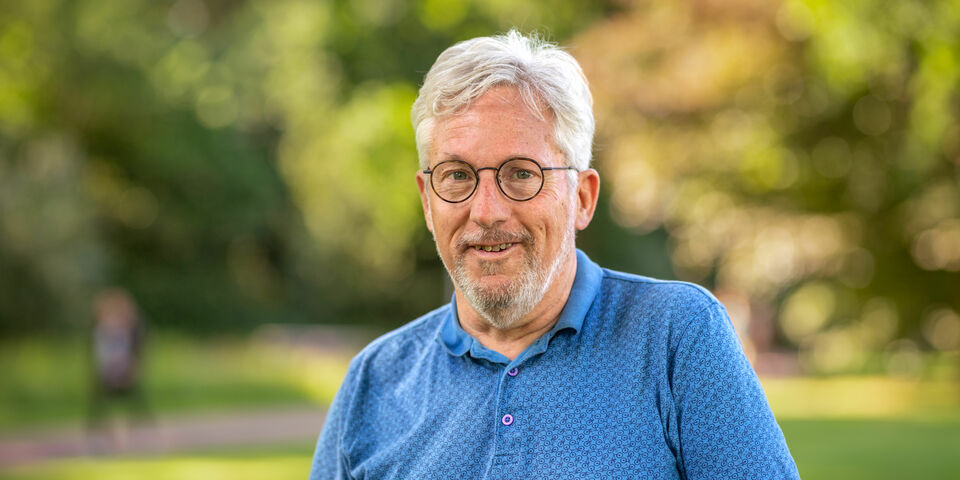“I care deeply about the wellbeing of international colleagues”
In the 19 years that he has worked here, Willem van Hoorn has seen TU/e become increasingly international. He has, in all modesty, played a major role in making internationals – as well as their partners who joined them – feel more at ease in a foreign culture. This July, he will retire.
If Willem van Hoorn had a business card, it would read: teacher/missionary/storyteller. Upon questioning, he would say that his mission is to connect people. And he would then give many examples in which he has given internationals in particular the chance to build a network in Eindhoven or simply to make their first friends.
His TU/e business card reads: Internationalization | Organizational Development | EuroTech Postdoc Academy, which can be summarized as policy officer for internationalization at HRM; a dream job for him: “Gosh, I get to call this work”. In the nineteen years that Van Hoorn has been associated with TU/e, he has achieved many accomplishments. Below, we highlight three of them.
Darling projects
“I got involved with Euraxess, a European organization that provides practical support to researchers and their families when they relocate for work reasons. There are two goals: to proclaim to the rest of the world that Europe is a wonderful place to do your research, and to try to remove all kinds of obstacles to immigrants within Europe.” Part of the attention goes out to the accompanying partners.
That brings the missionary to another highlight: based on a program developed by a social entrepreneur in Eindhoven, we set up a social support program for accompanying spouses. Weekly meetings, an introduction to the city and the country, tips for finding certain spices at the Woenselse Markt, etc. This program, Get in touch, was voted ‘Best family support program of Europe’ in 2014.”
The teacher also likes to point out that he and several enthusiastic TU/e postdocs founded the TU/e Postdoc Association. “It’s become one of my ‘darling projects’. In the last two years, we’ve developed the association into a voice for the more than three hundred postdocs at TU/e, a meeting place and a platform for professional and personal development. We once had contact with the people from PostdocNL, and they were very impressed with everything we’d managed to set up together, in spite of the pandemic.”
By chance
Willem got involved in the world of internationalization by chance. He had started as a teacher trainer at what was then called the Education Service Centre (STU), after having worked as a medical imaging teacher at Fontys for a long time. In 2007, he and his immediate colleagues were transferred to HRM. In his introductory interview, Van Hoorn asked the director of human resources about their concerns. “Apparently, our international staff was the main concern. There had been a satisfaction survey which revealed that people who had left their traditional working and living environment needed at least a year to get used to a new living situation. They were suffering from homesickness, a feeling of not belonging, and that’s mentally exhausting for them, my new manager told me. I had a few interesting ideas to share, both because of my experience as a teacher and out of interest. It turned into a promising conversation.”
Continue reading below the photo.
The first thing Van Hoorn could do with this was conduct a socio-emotional perception survey among the six hundred internationals there at the time. “What can we do for you, we asked. One hundred and fifty technically trained internationals answered the survey and this insanely high response rate indicated that we were onto something. And based on these results, we started launching all kinds of projects.”
Transition
Today, TU/e is one of the country’s biggest employers for internationals in percentage terms. “Over one-third of the employees are non-Dutch. However, for a university as an employer, there is a big difference between having an international community and being an international community. I’ve seen us make this exciting transition to a great extent. But perhaps there are some areas we could improve on. For example, I’d like to see more world-oriented catering on campus. And more importantly, I would like our managers to have appropriate tools at their disposal to make diversity a top priority in their teams and to ensure that it stays that way. Because there is a lot of research that shows that diverse teams are more resourceful at generating ideas, and better at coming up with solutions than homogeneous teams. That applies to diversity in terms of age, gender and cultural background alike. Or a nice combination of those.”
Van Hoorn quickly adds that he does not think that managers are required to exploit diversity. “I don’t want it to be an additional burden that adds to the workload. Instead, I address this topic because meeting with people from different backgrounds is energizing. It’s beneficial for job satisfaction and team performance”.
Helpful
Van Hoorn has helped thousands of people over the past few decades. Just think of the more than two thousand internationals he has welcomed on behalf of TU/e and whom he has helped to settle. And the hundreds of Fontys students who developed into medical imaging professionals. And lots of accompanying partners who found their place in Eindhoven because of him. “The most important thing to me is that all those people feel seen.”
Looking back on his TU/e career: “A lot was handed to me; I took it and turned it into something beautiful. I will continue that trend after my retirement. I haven’t really planned it out yet, but I trust that something beautiful will happen. Life, surprise me!”




Discussion